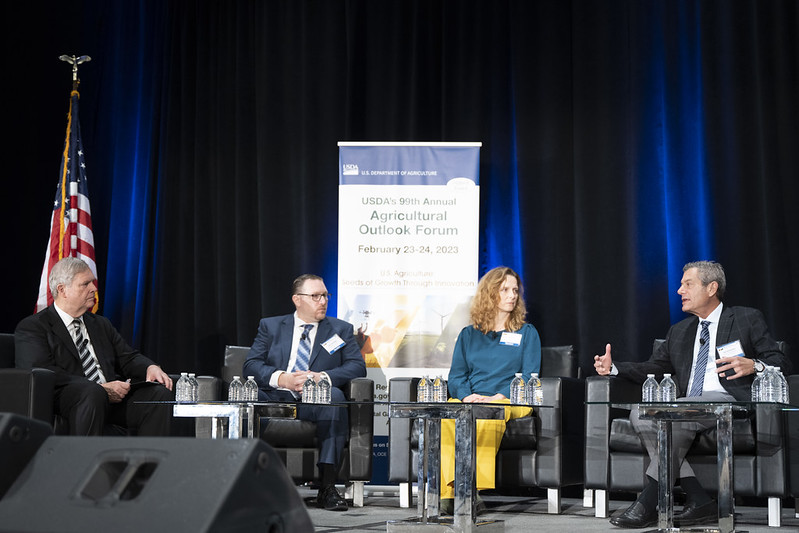There are a number of annual events that consulting firms for agricultural industries and rural development projects do not want to miss. This winter, DIS was represented at two of the biggest annual events for agriculture: the Agricultural Outlook Forum and the Commodity Classic.
The USDA Agricultural Outlook Forum (AOF) is billed as “USDA's oldest and largest annual gathering (that) began in 1923 to distribute and interpret national forecasts to farmers.” (USDA). AOF has grown over the years, to become the premier gathering for agricultural economists and USDA agency administrators. The AOF attracts more than 100 key national and global experts to present at over 30 sessions by over 2,000 on-site attendees from across the U.S. and overseas in February.
There are several key aspects to the AOF that explain its attraction for many experts. First, the event sets the tone for the current administration in Washington on policy issues. As such, the Secretary of Agriculture, Tom Vilsack, opening address and reappearance for a panel discussion with the Commissioner of Agriculture for the European Union emphasized new environmental programs and Climate Smart Agriculture. Secondly, the AOF showcases the year’s definitive USDA forecasts for all major commodities, plus food prices, that will then influence outlooks for at least the following six months of the year. Lastly, the live gathering of not only Washington insiders but also top national and international agricultural experts provides an electrifying atmosphere that feeds interviews and statements onto the front pages of many agricultural magazines, newsletters, and mainstream media.
This year, USDA Chief Economist Seth Myer presented the outlook for all major commodities, international ag trade and farm income. In the breakout sessions at the AOF, one could participate in lively Q&A sessions with top commodity analysts from both USDA and private companies, covering the outlooks for the sectors of cotton, dairy, livestock, poultry, grains & oilseeds, and organics. Additionally, policy-related seminars were held on diverse topics such as Climate-Smart Agriculture, foreign investment in US farmland, the impact of Ukraine on global ag trade, and the US western drought. All of the presentations are online following the event but attending in person provides great opportunities to ask questions and to hear spontaneous responses from influential panelists. Of course, just as importantly are the networking opportunities at the massive coffee breaks, commodity-specific luncheons, and after-hours socials.

The Commodity Classic is another legendary event for all of agriculture that DIS participated in this year. Affectionately known as simply “the Classic”, it includes workshops, seminars, lunch presentations, networking socials and an enormous exposition area. The Classic is aimed at the best farmers in the United States as well as the leadership of all the major farm and commodity associations, as well as the new ag-tech startups, agricultural equipment manufacturers, and support services, coast to coast. By having a DIS representative at the Classic, they were able to network with a number of statewide and national commodity associations.
This year, the Classic was held in Orlando, which was an inviting getaway from the Midwest winter climate and proved to be a big post-pandemic draw. A record attendance of over 10,000 visitors showed up to hear everyone from the USDA Secretary for Agriculture to subject matter experts on climate-smart agriculture and “carbon farming”. The sprawling exposition area, which can be almost overwhelming to the first-time participant, afforded discussions with board members, top staff, and executive directors of all the major commodity associations of the Midwest.
DIS participation in these national events updates staff with the latest perspectives by agri-industries and policy leaders, as well as expanding the DIS network of technical experts.

